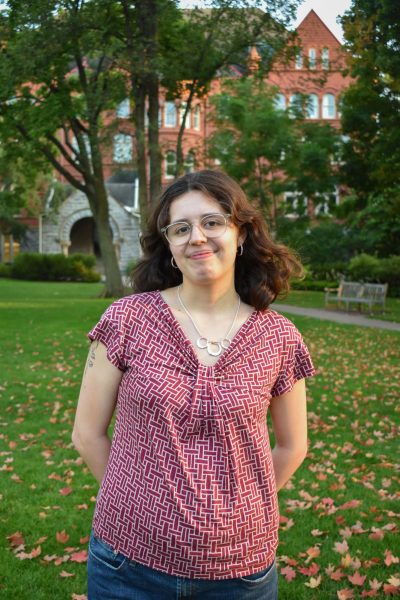On Thursday, March 27, University of Minnesota (UMN) student Doğukan Günaydin was forced into an unmarked car by plainclothes U.S. Immigration and Customs Enforcement (ICE) officers.
The following day, an international student from Minnesota State University (MSU) Mankato, whose name has not been made public, was detained as well. MSU stated they received no communication beforehand.
Günaydin held a student visa, which was terminated by the Department of Homeland Security seven hours after his arrest, purportedly due to a conviction for driving while intoxicated (DWI) in March 2024.
“If they were convicted of certain theft offenses, felonies … drug offenses, those categories of crimes remain fair game. A DWI is not on the books right now that way,” attorney David Wilson was quoted as saying in an article in The Minnesota Star Tribune.
According to his lawyer, Günaydin has not been given official documents providing the reason for his arrest. The federal government has yet to give an explanation for their detainment of the MSU student. Detention without reason is against the Fifth Amendment of the Constitution.
In the days following these detainments, universities across Minnesota discovered almost 30 student visas had been terminated without notice. Without a visa, students could face deportation if they do not leave the country within 60 days. These universities include MSU, UMN, St. Cloud State University and Metropolitan State University.
On April 16, a U.S. Customs and Border Protection (CBP) vehicle was spotted near Macalester’s campus. In response, Provost Lisa Anderson-Levy sent an email stating, “To our knowledge, no members of our community were approached or contacted” and offered support resources. The email also stated that to their knowledge, no Macalester students have had their visas revoked.
Since the inauguration of President Donald Trump in January, the rate of detainments by ICE have soared. The average daily number of immigrants being held in ICE detention facilities rose above 47,000 in March, the highest number since November 2019, according to the Transactional Records Access Clearinghouse.
International students engaged in pro-Palestine action have been especially targeted by illegal ICE detentions, in violation of their constitutional right to free speech. These include students Mahmoud Khalil, Mohsen Mahdawi, Rumeysa Ozturk, Yunseo Chung, Leqaa Kordia and Momodou Taal, as well as professor Badar Khan Suri.
While neither Minnesota student detained has been connected with activism, they are both from Muslim-majority countries, raising alarms about ethnicity-based detentions and fear for international students from the Middle East.
Macalester has outlined the procedure it plans to follow if ICE comes to campus, but has not stated what it will do if someone is detained.
“[The administration] told us that we should take ICE to Public Safety, and we should call Public Safety and they would handle it, but, a lot of times, ICE just grabs people,” said Student A, an international student at Macalester who wishes to remain anonymous due to safety concerns.
Olga González, associate professor of anthropology, echoed these concerns. She stated that while it is important to know your rights and appropriate procedure, “when you are living under an increasingly authoritarian regime with no respect for the rule of law, that might not matter.”
She advised those at risk to “[let] somebody or a few people who are close to you know where you are at all times, because if you don’t show up, they should begin to search for you immediately. Choose somebody who will be able to contact a lawyer.”
Given that those detained may not have access to their phones, she recommended they memorize the phone numbers of their main contacts.
González said that the college must commit to challenging the detention of students and the revocation of visas and should, if possible, provide legal representation for students and keep international students enrolled.
“I would expect the school to make any case high profile by ensuring it receives media attention — that’s a way to protect students from being disappeared,” González said.
“Institutional Equity told us that they have connections and they have worked on their connections,” Student A said. “They said they cannot disclose any more information.”
Interviewees speculated that the college’s hesitance to make commitments or communicate may stem from worries over drawing attention to the institution, which could lead the federal government to cut funding or send ICE. For this reason, Student B, a student advocate who wishes to remain anonymous due to safety concerns, stated the administration has also warned against student protests.
The administration has focused on protecting the safety of its vulnerable students through providing legal counsel and safety advice. International Student Programs (ISP) has advised many international students to not leave the country over the summer, due to the possibility that they will be denied re-entry.
“I wanted to go home over the summer because I have a valid visa,” Student A said. “And technically, I should be let back into the country when I come back. But, because there are so many illegal things happening right now, we cannot really trust that anymore. I cannot trust that I have a visa.”
In March, an assistant professor at Brown University who held a work (H-1B) visa was detained at the Boston airport and then deported to Lebanon for what the CBP called support of terrorists, despite a court order against her removal. That same week, a French scientist was refused entry after a CBP officer found messages critical of Trump on his phone. On March 7, a German green card holder was detained after returning from Germany; he is currently being held at a detention facility without explanation.
Student visa holders can be denied entry to the U.S. if they refuse to answer a CBP officer’s questions, including if they refuse to have their phone searched.
Some students who have changed their plans in order to stay in the U.S. are struggling to figure out how to financially sustain themselves over the summer.
International students can only work part time and jobs must be related to their study. Some international students don’t know what they will do without assistance from the college
“Nothing official has come out yet,” Student A said. “But the [ISP] told me that they will provide free housing. We don’t know about food yet, because the housing is gonna be on campus and it’s not really like cooking [is] an option here for three months.”
On April 16, ISP sent an email to international students stating, “ISP would like to know if holding an information session would be a helpful opportunity for international students to ask questions and/or share concerns.” More information may come to light in the coming weeks.
Students have also been pushing for the school to provide financial support for undocumented students who cannot work outside campus nor receive aid from federal work-study.
“[One of my professors] told me that during the pandemic, the institution had a lot of systems — specifically financial systems — to support students,” Student B said. “Because it was labeled a nationwide emergency … [I’m] pushing for the college to consider this as a nationwide emergency.”
While Macalester cannot explicitly give undocumented students a work study offer, Student B stated the school could find other ways to provide financial support, such as creating an emergency fund specifically reserved for students who cannot work.
For González, responding to a reality increasingly hostile to immigrants requires both institutions and individuals to “find balance between protection and resistance … I would be concerned if compliance becomes our main strategy for protection and ask if by complying, are we really protecting ourselves?”
As the political climate changes, methods for effective resistance change as well.
Student A worried that political protests on campus might do more to put vulnerable students in danger than to resist the attacks against them.
Student B noted the importance of students being thoughtful with protests on campus and consulting with international and immigrant students who might be at stake. They also believe continuing to pressure the institution through protests is essential and is not putting a target on the school, given the lack of news coverage.
González highlighted the need to negotiate between highly visible and “backstage” forms of protest and think critically about how to create safety and not let oneself be controlled by fear.
“The extreme isolation we can unintentionally create in our efforts to protect ourselves… only leads to fragmentation and weakening” González said.
Instead, González thinks solidarity and community are necessary for protection.
Student B, who said they have felt dehumanized by the ICE deportations and reactions to them, said solidarity needs to include “learning more about the experience and not just what people think the experience is or what they hear.”
They also emphasized the tangible impact of community action. They specifically mentioned Faithful Hospitality, an organization that the Community Engagement Center partners with providing housing and support to new immigrants at the churches near Macalester.
The federal government has targeted students using illegal and extrajudicial action, creating an uncertain future for international and immigrant students at Macalester.
This atmosphere of fear aims to encourage “self-deportation” and to silence dissidence. González recognizes the danger in this.
“We can’t leave room for compliance, obedience and docility,” González said.













